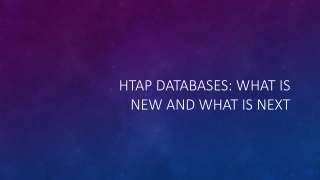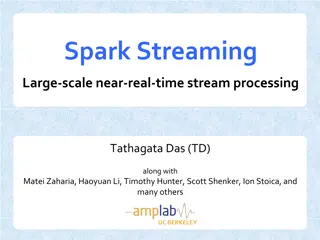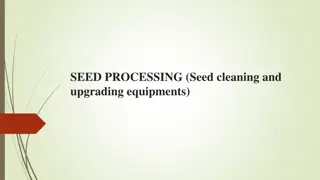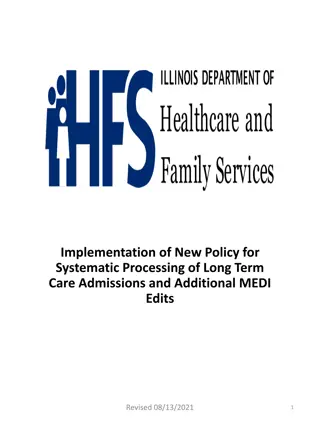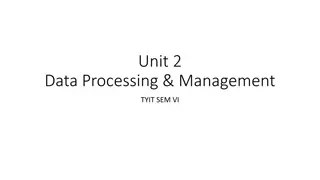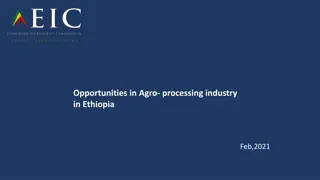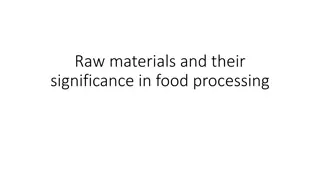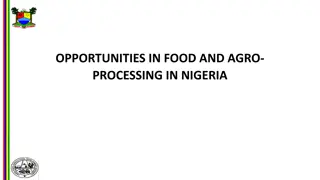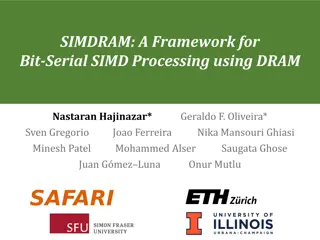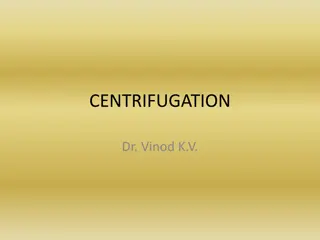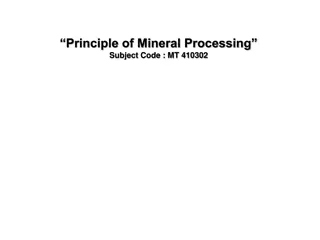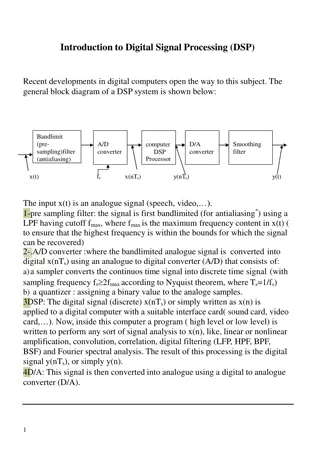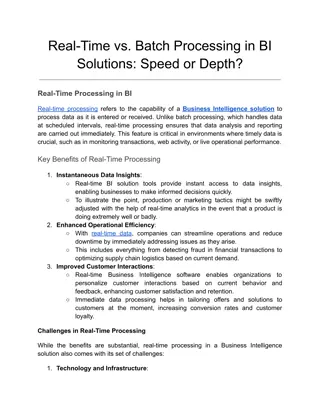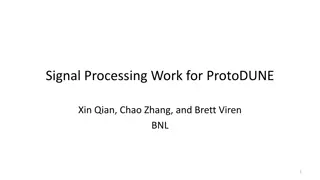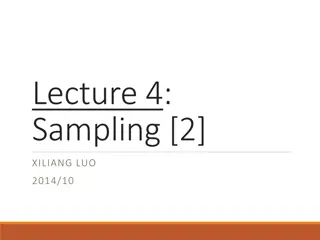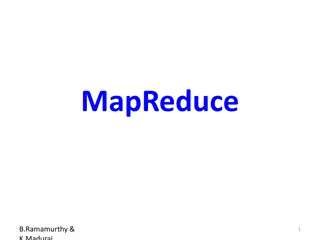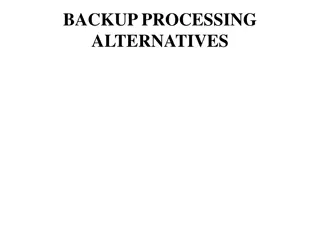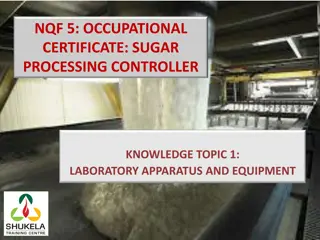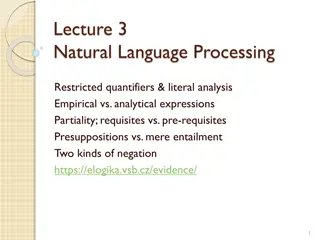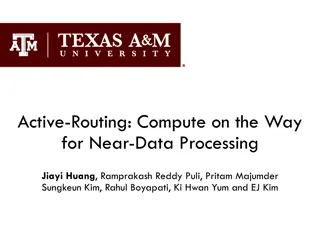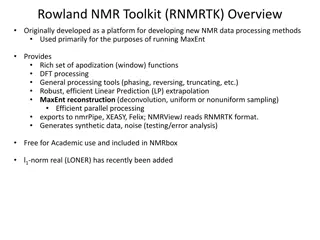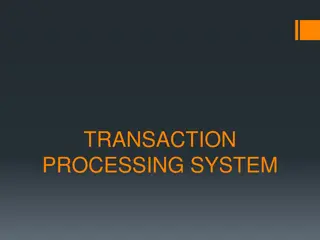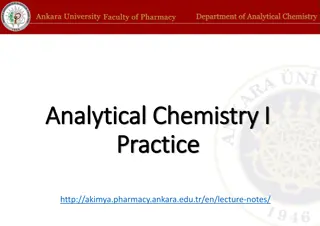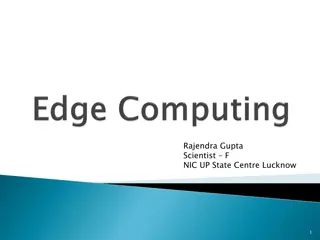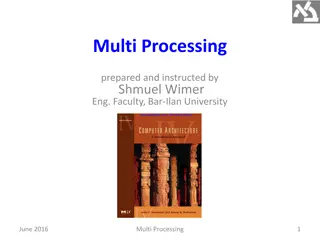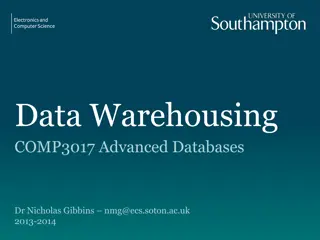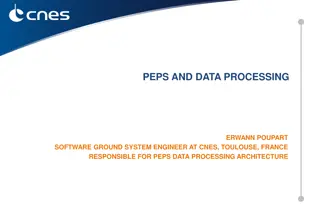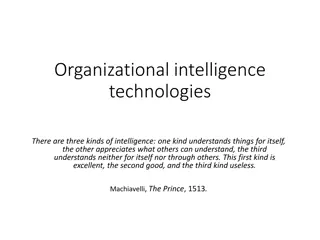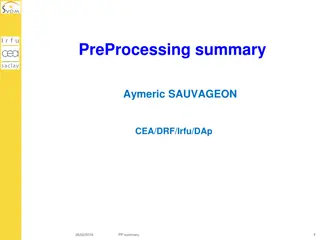Revolutionizing Data Management with HTAP Databases
Organizations handle a vast amount of data daily, necessitating efficient systems like Hybrid Transactional Analytical Processing (HTAP). This advanced system streamlines online transaction processing (OLTP) and analytical processing (OLAP), enabling real-time insights and prompt actions. HTAP datab
2 views • 22 slides
National Food Processing Policy and Its Importance
National Food Processing Policy aims to address the significant wastage in food production through value addition and efficient processing. The policy highlights the reasons for food processing, including reducing losses in the supply chain and enhancing quality. It emphasizes creating an enabling e
1 views • 19 slides
OBPMark and OBPMark-ML: Computational Benchmarks for Space Applications
OBPMark and OBPMark-ML are computational benchmarks developed by ESA and BSC/UPC for on-board data processing and machine learning in space applications. These benchmarks aim to standardize performance comparison across different processing devices, identify key parameters, and provide recommendatio
10 views • 20 slides
Introduction to Spark Streaming for Large-Scale Stream Processing
Spark Streaming, developed at UC Berkeley, extends the capabilities of Apache Spark for large-scale, near-real-time stream processing. With the ability to scale to hundreds of nodes and achieve low latencies, Spark Streaming offers efficient and fault-tolerant stateful stream processing through a si
0 views • 30 slides
Real-Time Data Insights with Azure Databricks
Processing high-volume data in real-time can be achieved efficiently using Azure Databricks, a powerful Apache Spark-based analytics platform integrated with Microsoft Azure. By transitioning from batch processing to structured streaming, you can gain valuable real-time insights from your data, enab
0 views • 23 slides
Efficient Layout Planning for Seed Processing Plant
Seed processing is crucial for removing contaminants and drying seeds to a safe moisture level. Planning a seed processing plant layout involves considering factors like types of seeds, operation size, equipment selection, location, labor availability, and more. Components of the building layout inc
2 views • 25 slides
New Policy for Systematic Processing of Long Term Care Admissions
This policy outlines significant changes in the processing of long-term care admissions through MEDI, aiming to streamline the submission process, improve efficiency, and reduce delays in reimbursement. Key updates include systematic editing upon submission, eligibility criteria for systematic proce
2 views • 34 slides
Evolution of Data Processing Systems in Geographic Information Science
Data processing systems in Geographic Information Science have evolved from manual, analogue methods to advanced software and hardware components. The incorporation of Geographic Information Systems (GIS) has revolutionized the handling and analysis of geo-referenced data, making tasks like data cap
0 views • 20 slides
Opportunities in Ethiopia's Agro-Processing Industry
Ethiopia stands out as a leader in raw material production for agro-processing industries, offering opportunities in dairy, juice processing, edible oil processing, poultry, beef production, and tomato processing. With abundant resources, suitable climate conditions, and a growing domestic market, E
0 views • 8 slides
Significance of Raw Materials in Food Processing
Effective selection of raw materials is crucial for ensuring the quality of processed food products. The quality of raw materials directly impacts the final products, making it important to procure materials that align closely with processing requirements. Quality evaluation, including microbiologic
2 views • 30 slides
Recent Developments in GAMIT/GLOBK for GNSS Processing
Significant updates and future developments in GAMIT/GLOBK for GNSS processing include processing of multiple constellations independently, transition to secure HTTP for code distribution, addition of azimuth field for station alignment, and regular updates schedule. Higher-order ionosphere and rapi
0 views • 10 slides
Understanding Computer Vision and Image Processing
Introduction to the fields of computer vision and image processing, exploring their differences and how they intertwine. Computer vision focuses on processing images for computer use, while image processing enhances images for human consumption. Topics include image analysis, restoration, enhancemen
1 views • 100 slides
Unlocking Opportunities in Food and Agro-Processing in Nigeria
Explore the potential for food and agro-processing in Nigeria to generate income, enhance food security, and boost the economy. Learn about the objectives, strategies, and reasons behind agro-processing activities, as well as the growing demand for convenience and processed foods in the country. Dis
2 views • 46 slides
SIMDRAM: An End-to-End Framework for Bit-Serial SIMD Processing Using DRAM
SIMDRAM introduces a novel framework for efficient computation in DRAM, aiming to overcome data movement bottlenecks. It emphasizes Processing-in-Memory (PIM) and Processing-using-Memory (PuM) paradigms to enhance processing capabilities within DRAM while minimizing architectural changes. The motiva
2 views • 14 slides
Understanding the Applications and Design of Analytical Ultracentrifugation
Analytical ultracentrifugation, a powerful technique in biochemistry, allows for precise measurement of sample properties and characterization of macromolecular complexes. The method is widely used for determining sample purity, equilibrium constants, and assembly mechanisms of biological complexes.
1 views • 17 slides
Principles of Mineral Processing in Extractive Metallurgy
Introduction to the principles of mineral processing focusing on the scope, physical characteristics, and economics of ore processing. The syllabus covers terminology, mineral resources in India, and the processing of industrial minerals like Haematite, Galena, and Chalcopyrite. Learn about ore depo
3 views • 20 slides
Overview of Digital Signal Processing (DSP) Systems and Implementations
Recent advancements in digital computers have paved the way for Digital Signal Processing (DSP). The DSP system involves bandlimiting, A/D conversion, DSP processing, D/A conversion, and smoothing filtering. This system enables the conversion of analog signals to digital, processing using digital co
1 views • 24 slides
Effective Strategies for Children with Developmental Language Disorder, Sensory Processing Disorder, and Fine Motor Delays
Children with Developmental Language Disorder (DLD), Sensory Processing Disorder (SPD), and Fine Motor Delays often have accompanying sensory and fine motor deficits. Research indicates that addressing sensory processing deficits can significantly benefit children with DLD, ADHD, autism, and other d
0 views • 61 slides
Real-Time vs. Batch Processing in BI Solutions_ Speed or Depth_
Dive into the dynamic world of BI processing where every second counts and every detail matters. This insightful blog navigates the crucial choice between real-time and batch processing, unraveling the trade-offs of speed and depth in data analysis. Discover how each approach can fuel your strategic
1 views • 7 slides
Advancements in Signal Processing for ProtoDUNE Experiment
The team, including Xin Qian, Chao Zhang, and Brett Viren from BNL, leverages past experience in MicroBooNE to outline a comprehensive work plan for signal processing in ProtoDUNE. Their focus includes managing excess noise, addressing non-functional channels, and evolving signal processing techniqu
1 views • 23 slides
Understanding Sampling and Signal Processing Fundamentals
Sampling plays a crucial role in converting continuous-time signals into discrete-time signals for processing. This lecture covers periodic sampling, ideal sampling, Fourier transforms, Nyquist-Shannon sampling, and the processing of band-limited signals. It delves into the relationship between peri
1 views • 60 slides
Understanding MapReduce in Distributed Systems
MapReduce is a powerful paradigm that enables distributed processing of large datasets by dividing the workload among multiple machines. It tackles challenges such as scaling, fault tolerance, and parallel processing efficiently. Through a series of operations involving mappers and reducers, MapRedu
7 views • 32 slides
Developing a Successful Backup Processing Strategy
This unit explores backup processing alternatives, contingency planning, and the importance of selecting and implementing alternate processing support in advance. It emphasizes the need for well-documented strategies to ensure rapid recovery from disruptions in data processing, along with identifyin
1 views • 128 slides
Essential Laboratory Apparatus and Equipment for Sugar Processing Controllers
The analytical results obtained from the laboratory play a crucial role in ensuring the smooth and effective functioning of sugar extraction and processing operations. Understanding and utilizing laboratory apparatus and equipment are key aspects of the Sugar Processing Controller's role, enabling t
0 views • 72 slides
Understanding Empirical vs Analytical Expressions in Natural Language Processing
Restricted quantifiers and literal analysis in natural language processing reveal the distinctions between empirical and analytical expressions. While empirical expressions refer to non-trivial intensions that require empirical investigation, analytical expressions denote constant intensions that ca
1 views • 19 slides
Wander Join: Online Aggregation via Random Walks in Database Workloads
Wander Join is a technique for online aggregation using random walks, addressing challenges in efficiency and correctness in both transactional and analytical database workloads. It allows for complex analytical queries such as TPC-H queries and provides insights into revenue loss due to returned or
0 views • 27 slides
Enhancing Near-Data Processing with Active Routing
Explore the implementation and benefits of Active-Routing for efficient data processing in memory networks. Motivated by the increasing demands for memory in graph processing and deep learning, this approach aims to reduce data movement, energy consumption, and costs associated with processing large
0 views • 46 slides
Understanding Advanced Databases and Online Analytical Processing
Explore the world of data warehousing, advanced databases, OLTP, and OLAP with Dr. Nicholas Gibbins. Learn about traditional processing styles, multidimensional databases, and the dynamic analysis techniques of Online Analytical Processing (OLAP). Understand the importance of asking "what if" questi
0 views • 33 slides
Overview of RNMRTK Software for NMR Data Processing
Rowland NMR Toolkit (RNMRTK) is a comprehensive software platform primarily used for NMR data processing tasks such as running MaxEnt, apodization, DFT processing, linear prediction, and more. It offers a robust set of tools for various processing needs and supports efficient parallel processing. RN
0 views • 17 slides
Applications and Importance of X-ray Fluorescence Spectroscopy in Analytical Chemistry
X-ray Fluorescence Spectroscopy (XRF) is a vital analytical technique used for qualitative and quantitative analysis of elements based on their X-ray emission characteristics. Dr. Uma Sharma, a Professor at Vikram University, details various X-ray analytical methods, including X-ray emission, Auger
0 views • 21 slides
Understanding Transaction Processing Systems (TPS)
Transaction Processing Systems (TPS) are vital components in capturing, storing, and processing data generated from various business transactions. They ensure efficient handling of high volumes of data while maintaining accuracy, security, and privacy. TPS operate through automated data entry, batch
0 views • 24 slides
Centre of Excellence in Signal Processing Activities and Progress Report
Broad areas of signal processing activities at the Centre of Excellence in Signal Processing include audio, speech, language, medical image processing, computer vision, wireless communications, and machine learning. The center focuses on addressing various challenges in audio/speech recognition, emo
0 views • 17 slides
Exploring Analytical Chemistry: Course Overview and Objectives
This article provides insights into the field of Analytical Chemistry, outlining a course syllabus, objectives, topics covered, and grading criteria. Analytical Chemistry involves obtaining and processing information about the composition and structure of matter. Analytical chemists play a crucial r
0 views • 15 slides
Understanding Edge Computing for Optimizing Internet Devices
Edge computing brings computing closer to the data source, minimizing communication distances between client and server for reduced latency and bandwidth usage. Distributed in device nodes, edge computing optimizes processing in smart devices instead of centralized cloud environments, enhancing data
0 views • 32 slides
Understanding Multi-Processing in Computer Architecture
Beginning in the mid-2000s, a shift towards multi-processing emerged due to limitations in uniprocessor performance gains. This led to the development of multiprocessors like multicore systems, enabling enhanced performance through parallel processing. The taxonomy of Flynn categories, including SIS
0 views • 46 slides
Understanding Data Warehousing and Online Analytical Processing (OLAP)
Exploring the concepts of data warehousing and OLAP, this content covers topics such as OLTP, OLAP processing styles, and the role of OLAP in dynamic enterprise analysis. It also delves into the critical explanations and scenarios of online analytical processing, providing insights into how to achie
0 views • 32 slides
Insight into PEPS Data Processing Architecture by Erwann Poupard
Erwann Poupard, a Software Ground System Engineer at CNES, Toulouse, France, plays a crucial role in the PEPS data processing architecture. The outline covers PEPS HPSS data storage statistics, current data processing trends, and future plans including PEPS V2 development. Explore PEPS processing ch
0 views • 8 slides
Understanding Organizational Intelligence Technologies
Organizational intelligence technologies involve three kinds of intelligence - understanding independently, appreciating what others can understand, and understanding neither for itself nor through others. This concept emphasizes the importance of collecting, storing, processing, and interpreting da
0 views • 47 slides
Data Processing and Preprocessing Summary
In this document, Aymeric Sauvageon from CEA/DRF/Irfu/DAp presents a detailed overview of the preprocessing steps involved in data processing from L0 to L1. It covers the definition of L0/L1 and coding, utilization of the database for processing, input file specifications from China, packet content
0 views • 11 slides
Mastering Analytical Paragraph Structure for Critical Thinking in Writing
Understanding the foundation of critical thinking in writing through analytical paragraph structure is key to effective communication. Analysis involves exploring the who, what, when, where, and why of a topic, making claims, and drawing connections. Differentiating analytical paragraphs from standa
0 views • 6 slides
